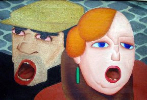12. DIE GHEDUERIGH MET VERMAECKEN
Tegen de onnutte Goet-verquisters
Toon: Hoe helder schijnt het Maentje. Of: Wis ghy hadd' et Spel verloren
Die gheduerigh met vermaecken
Altijdt even vrolijck neurt,
Ende noyt met leeghe kaecken
Elders om en sit en treurt,
Noch quelt,, om Geldt,
Maer gheduerich queelt,
En een lustigh Deuntje speelt;
Om Geldt, maer gheduerich queelt,
En wien 't nimmermeer verveelt.
Beesjes die des Somers singen
In 'et langh-ghewassen Riet,
En met langhe beenen springhen,
Sietmen 's Winters nimmer niet.
De Mier, dat Dier
Is van wijser aerdt:
Want 'et Somerdaeghs vergaert;
Dat Dier,, is van wijser aerdt,
Want 'et voor den Winter spaert.
Die sijn daghen wil ten ende
Brenghen, sonder dat verdriet,
Sonder kommer en elende,
Maeck hy staegh de Mier besiet,
En doet,, soo vroet
Altijdt nu voortaen,
Soo sal hem gheen hongher scha'en;
Soo vroet altijdt nu voortaen,
Soo en sal hy niet vergaen.
| 12. HE WHO IS CONTINUAL IN AMUSEMENT
Against the unnecessary dissipation of goods.
Tune: Hey! How brightly shines the moon. Or: Certainly you have lost the game.
He who is continual in amusement
Always hums quite joyfully,
And never with idle jaws
Elsewhere turns around and weeps,
Nor torments himself about money,
But continually warbles,
And plays a lusty tune;
About money, but continually warbles,
And he will nevermore be bored.
Little beasts which sing in the summer
In the overgrown reeds,
And hop with long legs,
Never see winter coming.
The ant, that creature
Is of a wiser nature:
For it gathers in summertime;
That creature is of a wiser nature,
For it saves for the winter.
He who will bring his days to an end,
Without that grief,
Without affliction and misery,
Must constantly take the ant's view,
And do so early
Always now and in the future,
So no hunger will harm him;
So early always now and in the future,
So he will not perish.
From Anthony Janssen, Christian Amusement (1645).
Translation: Gary K. Waite |

